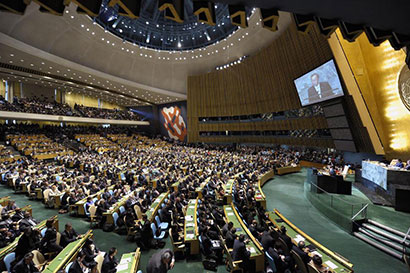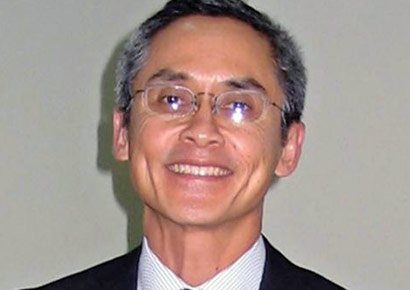South Africa is working to sabotage UN LGBTI rights victory!

UN General Assembly (Pic UN News)
Update 11/11/2016: South Africa’s Department of International Relations has categorically denied that it supports efforts to suspend the recently appointed UN LGBT watchdog. Details here.
Once again betraying its constitutional obligations, the South African government is working with other African countries to block a major LGBTI rights victory at the United Nations.
It’s been revealed that South Africa has signed on to a letter and (by implication) a resolution that aim to suspend the recently established position of an Independent Expert on Protection against Violence and Discrimination Based on Sexual Orientation and Gender Identity.
In June, the country shocked the world when it abstained in the landmark vote at the UN Human Rights Council (UNHRC) to appoint the global LGBTI watchdog.
South Africa’s Ambassador Nozipho Mxakato-Diseko bizarrely justified the country’s position by accusing the nations that sponsored the resolution of “grandstanding, recklessness, brinkmanship and point scoring”.
The vote was, however, successful and Thai international law professor Vitit Muntarbhorn was appointed to the position in September.
It now seems that he may never get the chance to do his work. South Africa, as part of the African Group of countries, is trying to scuttle the initiative by calling for the General Assembly to vote to undo the UNHRC’s resolution.
In the letter supported by South Africa, the countries write that they are “disturbed at the attempt to focus on certain persons on the grounds of their sexual interests and behaviours, while ignoring that intolerance and discrimination regrettably exist in various parts of the world, be it on the basis of colour, race, sex or religion, to mention only a few”.
They go on to say: “The adoption of the resolution 32/2 entitled ‘Protection against violence and discrimination based on sexual orientation and gender identity’ in June 2016 is a clear illustration of these attempts.
“The Group is therefore concerned that non-internationally agreed notions such as sexual orientation and gender identity are given attention, to the detriment of issues of paramount importance such as the right to development and the racism agenda.”
The countries claim that the UNHRC resolution interferes in “matters which fall essentially within the domestic jurisdiction of States…”
They furthermore insist that the “notions” of sexual orientation and gender identity “are not and should not be linked to existing international human rights instruments”.
South Africa is effectively arguing that countries should have the right as sovereign nations to oppress and persecute their LGBTI citizens without any international intervention; this from a country that was well served by global outrage, activism and political pressure in helping to end apartheid.
It is important to note, nevertheless, that the Independent Expert does not actually have the power to directly interfere in any country’s affairs but rather to assess, raise awareness and cooperatively work with nations to improve the plight of LGBTI people.
The African countries have also tabled a resolution calling for the deferral of the UNHRC resolution for “further discussion and consultations” and for the “suspension of the activities of the appointed Independent Expert pending the determination of this issue”.
The letter represents a hardening of South Africa’s approach to international LGBTI issues; from the abstention in June to now actively opposing the Independent Expert.

Professor Vitit Muntarbhorn
The resolution, which is expected to be voted on by the General Assembly on Monday or Tuesday, is being seen as unprecedented. It would, if passed, undermine the authority and role of the UNHRC.
South Africa appears to be actively working to unravel major international human rights mechanisms, including recently deciding to withdraw from the International Criminal Court.
In a scathing response to South Africa’s latest ill-considered move, the Canadian-based LGBTI rights organisation ARC International said that the country’s endorsement of the letter “betrays its anti apartheid history, its constitution and its own actions on the international stage supportive of LGBT rights…”
The group’s Geneva Director Arvind Narrain noted that past South African leadership was crucial “in breaking the false notion that LGBT rights were a western import” and “to assert that there were LBGT people in every part of the globe…”
He wrote: “South Africa which in 2011 was the beacon of hope for LBGTI communities around the world, today seems to have reversed its position. A lot hinges on South Africa’s vote, and LGBT communities around the world are looking to see if the South African government hearkens to its own constitutional conscience and dissociates itself from a resolution which is a betrayal of all that South Africa has stood for at the international level.
“We call on our comrades within South Africa to do all that they can to ensure that that on 7th November, 2016, their government does not betray its Constitutional commitments as well as the hopes and aspirations of millions of LGBT persons around the world,” Narrain said.
- Facebook Messenger
- Total475
It makes me feel sick to the stomach to read about people still opposing Human Rights / Gay Rights.
What else would you expect!!
Racism and SeX ism are both evil and you cannot pretend to fight the one and claim that you need to discuss the other.
To ignore the LGBTI rights while insisting that the world concentrate on fighting racism is both short sighted and detrimental to all oppression
Given South Africa s history we should be leading the field in this regard not working to undo all that our Constution enshrines
AIDS AND RIGHTS ALLIANCE FOR SOUTHERN AFRICA (ARASA) STRONGLY CONDEMNS RESOLUTION TABLED BY AFRICAN STATES AGAINST UNITED NATIONS INDEPENDENT EXPERT TO PROTECT LGBTI RIGHTS
Windhoek, Namibia, 7 November 2016: The AIDS and Rights Alliance for Southern Africa (ARASA) strongly condemns the resolution tabled by African states to halt the work of the first United Nations (UN) Independent Expert appointed to help protect the human rights of lesbian, gay, bisexual, transgender and intersex (LGBTI) people.
The United Nations Human Rights Council created the position in June 2016 and in September appointed Vitit Muntarbhorn, who has a three-year mandate to investigate and address human rights abuses against LGBTI people. On Friday, 4 November 2016, African states circulated a draft resolution to the United Nations General Assembly Third Committee, which deals with human rights, calling for consultations on the legality of the creation of the mandate. “We call for the suspension of the activities of the appointed Independent Expert pending the determination of this issue,” Botswana’s UN Ambassador Charles Ntwaagae, speaking for the Africa group, told the committee.
ARASA strongly condemns this move by African states. The Yogyakarta Principles on the application of International Human Rights Law in relation to Sexual Orientation and Gender Identity recommends that states cease any state-sponsored or state-condoned attacks of persons based on sexual orientation or gender identity, and ensure that all such attacks, whether by government officials or by any individual or group, are vigorously investigated, and that, where appropriate evidence is found, those responsible are prosecuted, tried and duly punished. The appointment of the United Nations (UN) Independent Expert gives practical effect to these principles and shows the commitment of the United Nations to upholding the human rights of LGBTI people globally.
In a report entitled Identifying Injustice: Laws and Policy on Sexual Orientation, Gender Identity and HIV in Southern Africa released by ARASA in June 2016, ARASA outlines how laws and policies in ten countries in Southern Africa impact the lives, heath and rights of LGBTI people. The report highlights how despite existing national, regional and international human rights protections, LGBTI people in southern Africa experience human rights violations concerning free expression, association and assembly on the basis of gender expression.
“The protection of human rights is essential to ensuring access to sexual and reproductive health services, especially in relation to issues of sexual orientation and gender identity. Even in countries that offer legal protection to the LGBTI community, the reality faced by the individuals who live there is often far from reflective of this protection. Ongoing violence against lesbian women who have sex with other women in South Africa and recent backlashes against the LGBTI community in Malawi and Tanzania, prove that there is still a long way to go. Efforts to protect the rights of LGBTI people should be encouraged, not opposed,” stated ARASA Director, Michaela Clayton.
In a welcome move in 2014 the African Commission on Human and People’s Rights adopted Resolution 275 on Protection against Violence and other Human Rights Violations against Persons on the basis of their real or imputed Sexual Orientation or Gender Identity .The passing of this resolution was a significant recognition on the African continent that LGBTI people are just that – people – whose rights must be protected.
Botswana’s Ambassador told the General Assembly Third Committee on Friday that the committee should not be looking into “sexual orientation and gender identity” as “those two notions are not and should not be linked to existing international human rights instruments.” The group is allegedly concerned that gay rights issues would take precedence over “other issues of paramount importance, such as the right to development and the racism agenda.” This is both surprising and disappointing, given the recognition afforded by the African Commission on Human and People’s Rights to the human rights of all people, including LGBTI people.
ARASA calls on the United Nations Third committee to disregard the resolution proposed by the Africa group and to continue investigating and addressing human rights violations against LGBTI people in the region. ARASA also calls upon states to develop and implement at country level, human rights strategies to address legal and policy enabled discrimination against LGBTI persons, with a focus on barriers in accessing health facilities and services and HIV related care and services.